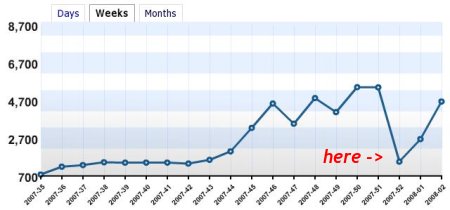Via Web Worker Daily I learned about Blog 365. That’s a nice idea which I heard and did before, and which I think is still valuable enough to bring attention to.
More and more people are joining the blogosphere every day. More and more people ask the same questions over and over – “how can I improve my blogging?”, “how can I get more comments?”, “how can I promote my blog more?”, etc. To all of them I answer – Blog 365.
You see, the hardest part of blogging is … actually, blogging – thinking about things, finding things, preparing content, and posting it. You can have all bells and features on your blog, and it can be search engine optimized to no avail, but if you don’t publish any posts, nothing will matter. Most blogs get lost and disappear because they don’t get updated anymore.
Now, if you are new to blogging, then posting every day may sound like a hard job to do. I’ll tell you a little secret – it is, but for just a few weeks. The thing here is to make blogging into a routine. Once your brain understands that it has to produce at least one post every day, it will start looking for and creating content by itself. You won’t have to do anything, but pick the bits that you like better and write them down.
I did a “have to publish at least one post every day” experiment a few times myself. The longest one was, I think, in 2004 and ran for about a year and a half. My posts varied from thoughts, notes, and simple links to somebody else’s pictures and videos. Eventually, I got it into my system. I had no problems posting something every day. Even better than that. There was a period of time when I felt uncomfortable if I didn’t publish anything.
Sure, I did my share of polluting the web with crap that nobody cares about. But that was all for the better. Here are the benefits from the top of my head:
- my English got better. Much better.
- my touch-typing got better. Much better.
- my Google skills got better. Much better.
- my reasoning got better. I learned that if I say something, I might be asked for a reference, so I learned to check those references before I was saying anything.
- my blog got more popular (more incoming links, more and better search engine results positioning, more people coming in and staying, more comments)
- my understanding of many social (people, communications, other cultures) and technical (Internet, blogging tools, search engines) topics improved a lot.
- I found a few more friends (not as in “close friends”, but as in “people with who I enjoy talking a lot”) that I wouldn’t have met otherwise.
These are just a few. There are many more. Like all those archives that I can search through and cross reference now…
So, if you are interesting in blogging, the Internet, or communications, take my advice – join the Blog 365 project. It’s much easier to do this with several other people, than alone. They understand what you are going through and how tough it is during the first few weeks. They’ll help you out with ideas, tips, links, and comments. You’ll get more out of it than you can imagine. We all will. Just give it a try.
Blogging is a skill. It’s like tough-typing, programming, riding a bicycle, or driving – you can read all about it you want, but you won’t get any better until you’ll sit down and start blogging. A lot. So, here is your chance. Take it!
